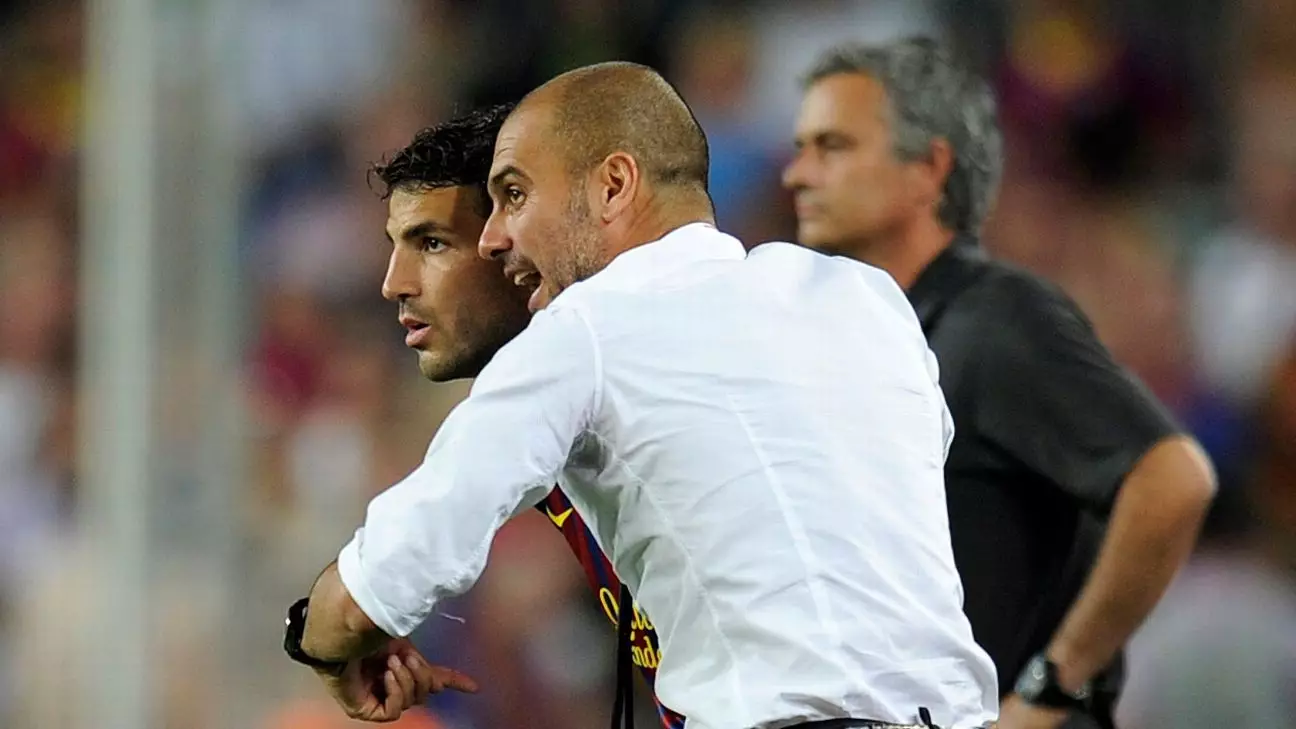Cesc Fàbregas, the 37-year-old former midfield maestro, has transcended his playing career to enter the realm of coaching, a journey that has elicited insights gained from some of football’s most iconic figures. His time under coaches like Arsène Wenger, José Mourinho, and Pep Guardiola not only shaped him as a player but also laid essential foundations for his current aspirations at Como, a Serie A club where he is now the head coach. In a recent conversation, Fàbregas shared how each of these managers influenced his approach to the game, offering invaluable lessons that he now strives to pass on to his players.
During his eight-year tenure at Arsenal, Fàbregas received an education steeped in finesse and patience from Wenger, a model of dignity and professionalism. The Frenchman is often heralded for his ability to nurture talent, and Fàbregas contends that understanding the importance of patience is a vital lesson that resonates in today’s fast-paced football landscape. “Football today is fragile,” he notes, drawing attention to the relentless pressure coaches face to secure immediate results. “You lose a couple of games, and the axe can fall at any moment,” he cautions, highlighting the growing trend of choosing seasoned players over emerging talent—often to the detriment of younger players needing development.
Fàbregas’ commitment to investing time and effort into nurturing young talent is a tribute to Wenger’s philosophy. In his current role at Como, he recognizes that cultivating potential requires more than just raw talent; it needs consistent support and time, a facet of coaching that is often overlooked. “With youth comes unpredictability,” he admits, acknowledging that continuous engagement in training sessions is crucial for player growth.
Fàbregas’ trophy-laden stint at Chelsea under José Mourinho introduced him to the power of decisiveness. The Portuguese manager, revered for his tactical savvy and psychological acumen, instilled in Fàbregas the courage to make bold choices. His description of Mourinho as “very brave” underscores the importance of not shying away from challenging decisions, particularly under pressure. The willingness to make significant changes mid-match—sometimes at half-time—highlights a tactical approach that values adaptability and foresight.
Mourinho’s knack for understanding player dynamics and leveraging their mental states resonates deeply with Fàbregas. The ability to gauge which players are mentally equipped to handle stress and perform under pressure is a skill that Fàbregas seeks to emulate as a coach. “You have to be quick in your assessments,” he reflects, suggesting that success often hinges on those critical moments of judgment.
If Wenger taught him patience and Mourinho imparted bravery, Fàbregas asserts that Pep Guardiola provided the most profound tactical education. The former Barcelona coach’s meticulous preparation and profound understanding of the game have left an indelible mark on Fàbregas, who claims that Guardiola changed the way he perceives football. “Tactically, Pep is the one I learned the most from,” he states, emphasizing the importance of studying opponents and implementing solutions on the fly.
Fàbregas mirrors Guardiola’s methodology by striving to equip his players with the tools to read the game effectively. He underscores the importance of proactive decision-making on the field, advocating for players to develop an acute awareness of situational dynamics. This approach is fundamental as Fàbregas embarks on his coaching journey, aiming to meld these lessons into a cohesive philosophy for his team.
As Cesc Fàbregas steps into the world of coaching, the synthesis of his experiences under Wenger, Mourinho, and Guardiola charts a promising course. By embodying the patience of Wenger, the audacity of Mourinho, and the tactical prowess of Guardiola, Fàbregas is not only positioned to make a significant impact at Como but also to redefine how emerging coaches can mold the next generation of football talent. His journey stands as a testament to the potential of blending diverse teachings to create a unique coaching identity, ultimately hoping to leave an indelible legacy of his own.

Leave a Reply